#foils
Text
King really has a whole thing about being seen as a toy, a pet, for people to own and play with without his permission. An object to look nice and pretty and not much else, without any wants or needs of his own.
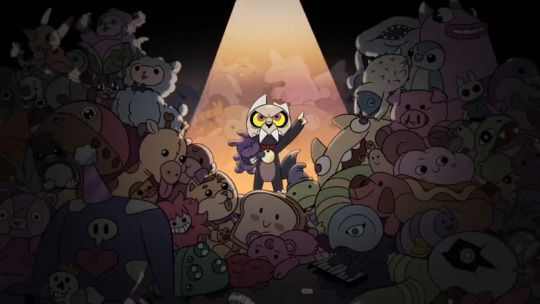
So it feels very poetic that he constantly surrounds himself with toys and plushes to command over; King’s whole Tyrant schtick isn’t just a fantasy for him, it’s a way for him to reclaim lost autonomy by exercising his own control. It’s as if King FEELS like a toy, so he commands other toys because he’s essentially one of them. And it reflects on his juvenile nature, not being taken seriously, the revelation that it’s only ever been pretend, etc.
That makes King’s relationship with Francois very sweet, as a toy from the human world he finds, no thanks to Luz helping him. Luz is someone whose physical cuddling and affections King DOES appreciate, because by the end of the day, Luz respects King as a person and his boundaries. King wants affection actually, but he wants it on his own terms, and there’s a lot of moments where he ‘commands’ Luz and she happily obliges, defends him, etc. Luz is very thoughtful of King’s feelings, and The Intruder is a major episode in which Luz learns to be more mindful of King in general; This of course wins the approval of his father the Titan, who decides to show Luz the light glyph for her kindness.
But anyhow, King loves Francois and treats him kindly, often as a partner and even equal. So with all I’ve said about King’s toy motif, that transitions perfectly into his dynamic with the Collector. There’s the fact that in their initial interactions, the Collector glomps onto a clearly uncomfortable King, like a child with a pet he doesn’t quite understand is a living creature (and in King’s case, not just a pet either but a person). Dana’s own art encapsulates their relationship by portraying King as a terrified plush that the Collector loves;
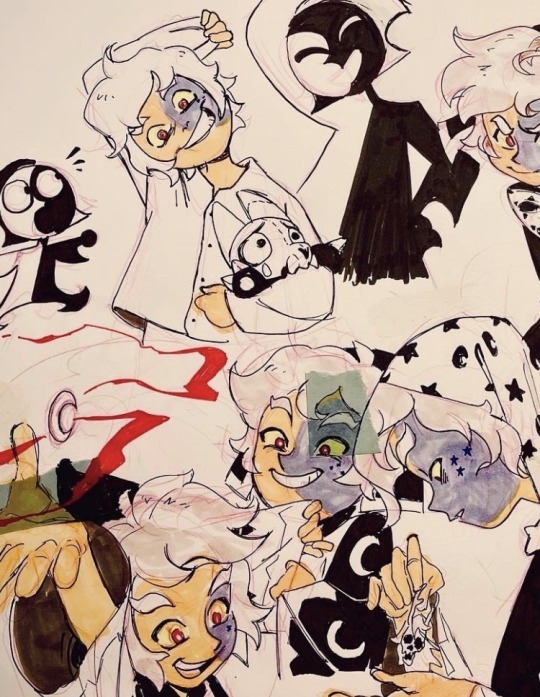
The Collector is also juvenile and loves to play pretend, and treats people like toys, which is exemplified by them transforming victims into literal toys, who are dressed up to look even prettier. But for all their issues with boundaries, the Collector seems to genuinely love and value their toys, kind of like King with Francois.
This contrasts them with Belos, whom they believe breaks his toys out of fun; That speaks to their different desires, hence the Collector insisting they want to make friends out of others, whereas Belos finds it more simple and satisfying to just destroy his enemies. So the Collector regards his toys as, well, toys; But with a sort of loving respect that a kid who takes good care of their toys and makes sure they’re taken care of does. A projection of feelings and personality… Over the actual feelings and personality that DO exist, but alas.
But that’s where the Collector’s relationship with King develops, because over the course of two months, they begin to respect and listen to King more, value him as a friend, etc. The Collector is more mindful of King’s boundaries, doesn’t immediately glomp onto him, actually bothers to respond to King’s criticisms. When King says the Owl Beast isn’t ready, they listen, and it’s implied the Collector has known about King visiting Eda and Lilith behind their back, but simply allowed it because friends keeping secrets is totally normal, right? And anyhow, King has been so nice, and they love King so much, they don’t want to call him out and ruin things; He can have this.
Which leads to Francois, whom King relates to; The toy that the Collector WANTS to cuddle with. But King sets the boundaries that it’s for him (and Luz) only, and the Collector actually listens. He doesn’t touch Francois behind King’s back, and aside from a moment where he has to take it from Belos’ grasp to defend Francois, puts it right back where it belongs. He can’t have Francois, but the Collector can settle for having him BE there, so close and yet so far.
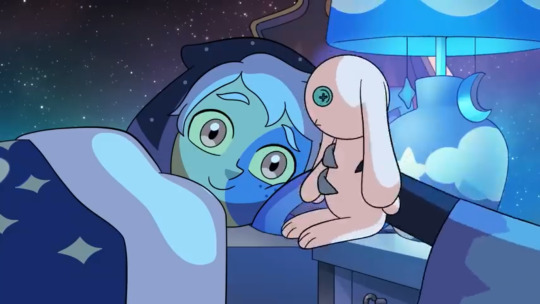
King is Francois; He’s a beloved toy to the Collector that he loves and appreciates, treats more special than the rest, and practically as a person, a lot of the time. But he’s willing to respect Francois’ boundaries and not play with him when he doesn’t want, just as he does with King, and his visits to his mother and aunt. The Collector obviously has a lot to learn when we check up on them two months later, and King understandably still IS frustrated, hence why he calls out the Collector after the nightmare illusions at the beginning of the series finale…
But King can tell, as a former, unruly child himself, who was only a non-issue because he lacked the power the Collector wields; The Collector is a kid like him. Who’s also learning. Who ultimately means well. And they’ve proven to be rather receptive over these two months; Not quite there, but if you put in the effort to teach and work with them, King is certain it’ll pay off as it did with him.
The Collector was a tyrant like King, and like King, a lot of this comes after being helpless because of others as well; The Collector was put into the care of the manipulative Archivists, and later trapped by the Titan. The only way to contact them was with a disc, an object, and their word was exploited by Bill so he could lead the Titan Trappers and finish the genocide of the Archivists. If the Grimwalkers were toys to Belos, so was the Collector, for him to hide away from everyone else, as his own, like a twisted Francois. And when he’s done with the Collector, he drops him into the pit with the rest of the discarded toys he loves to break.
So like King, the Collector being a tyrant isn’t just the result of kids being kids, it’s also a response to their lack of agency. And tbh, kids in general lack agency, hence why they can be quite unruly troublemakers and rebels, so it makes sense that the Collector also overcompensates, like King does! But both of them learn to be more mindful of boundaries, that their own pain doesn’t justify them doing the same to others, either.
The Collector notes that King isn’t the only person allowed to touch Francois; There’s also Luz. Luz, the kindly older sister who always listened to King and was attentive to his needs, respected him, and was often desired for physical affection. The Collector wants to BE Luz since King admires her so much, hence emulating her while playing Owl House; And Luz also recognizes their similarities, with the forgiveness she gives the Collector, being a form of forgiveness towards herself for being an ‘unruly’ child.
And the Collector also grows, has their loss of innocence, but nevertheless matures, as Luz did. They learn about death, just as Luz learned about death when she lost her father; And the Collector technically loses the Titan that night, who was arguably a turbulent father figure who failed them, too, and laments this fact to Luz. The Collector IS Luz, and like Luz in The Intruder, who gains the approval of the Titan with a light glyph, just as the Titan apologizes for the Collector and lends his power to protect them and others…

The Collector mends their friendship with King and makes it real. They respect and listen to him completely now. And so they get to finally be Luz, not just in their relationship with her, but also in their relationship with King, being allowed to love Francois, even being given him for company by King. Just as Luz is allowed to be King’s friend, and he follows her regularly, even sacrificing himself for her at the end of Season 2.
King and the Collector are toys who want toys to reverse that dynamic; But in the end, nobody can be a toy. And so they grow up and get to play with actual friends, and be friends to others.
591 notes
·
View notes
Text
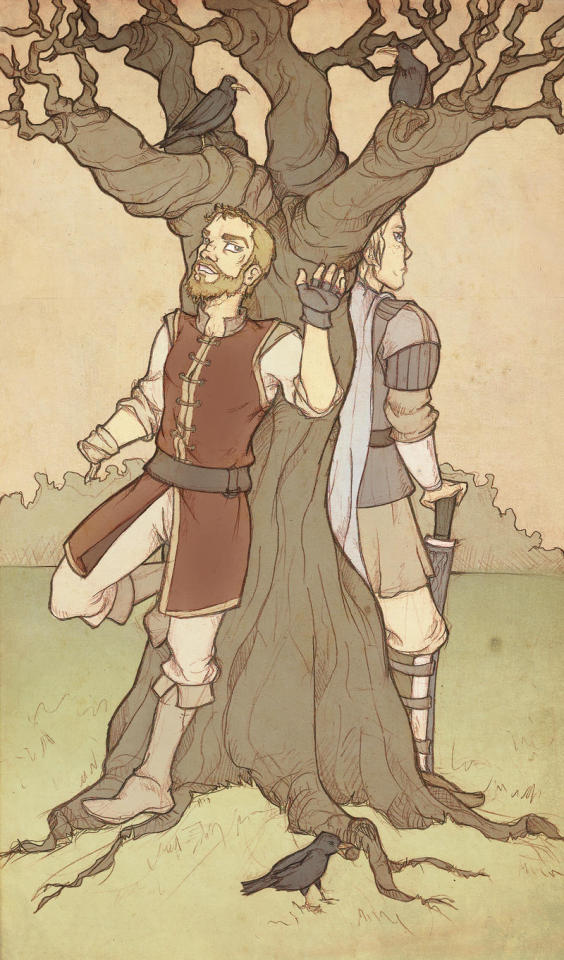
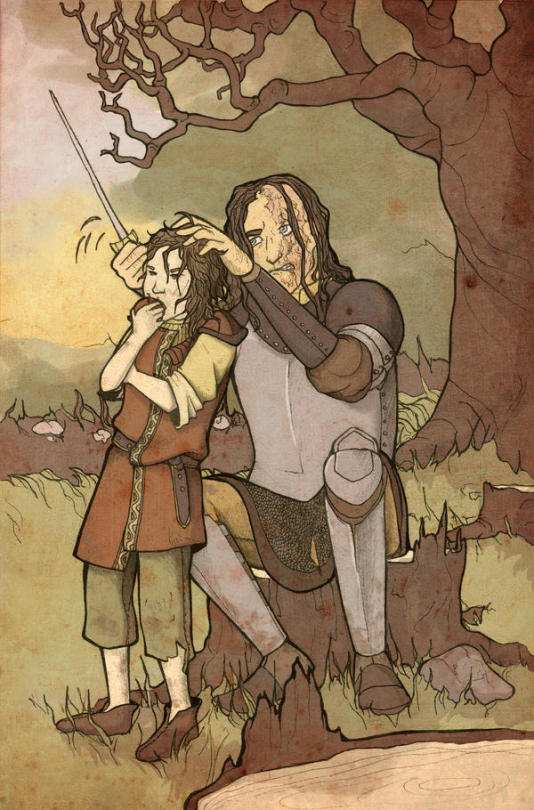
Interviewer: You have great foils for your characters, like Jaime travels with Brienne of Tarth. And there are other pairings, like Arya with the Hound. Do you consciously think of creating foils?
George: Well, drama arises out of conflict, so you like to put together two characters who are very different from each other and stand back and watch the sparks fly. That gets you better dialogue and better situations.
- George R.R. Martin, Vanity Fair (2014)
#Jaime Lannister#Brienne Of Tarth#Arya Stark#Sandor Clegane#Foils#George R.R. Martin#ValyrianScrolls#ASOIAF
192 notes
·
View notes
Text
Baylan is really interesting in all the ways he is still both a Jedi and not a Jedi, a perfect foil to Ahsoka but also he thinks he's not like Ahsoka.
It's been suggested his Force talent is mind-reading, he knows Anakin and Vader are one and knows enough to poke at Ahsoka.
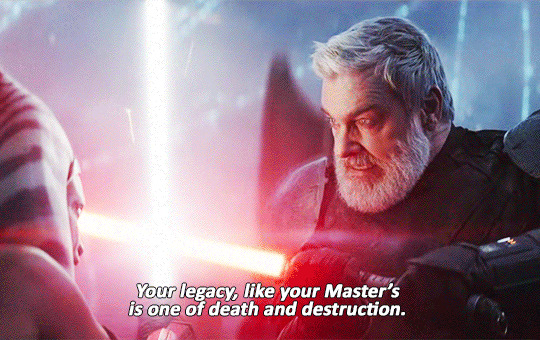
"Your legacy, like your Master's, is one of death and destruction."
And this is just a surgical strike to Ahsoka's psyche because this is what she's afraid of -- that she is too much like Anakin. She kind of is -- in terms of her lethality and the way she can be very pragmatic in war.
But also her own legacy in the Rebellion, as we saw in Andor doing intelligence work doesn't make your hands clean. Ahsoka was Fulcrum, she was the one who organized the intelligence network of the Rebellion.
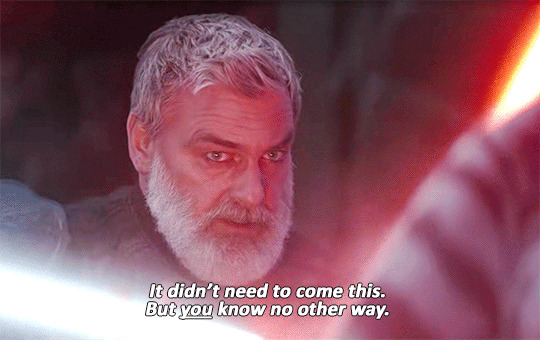
"It didn't need to come to this. But you know no other way."
The way he is judging Ahsoka for being Anakin's apprentice, and the way he thinks that the only thing Ahsoka knows is to escalate to violence.
Baylan is a hypocrite in this way too because he didn't need to kill the Captain, but he did.
Also, his whole:
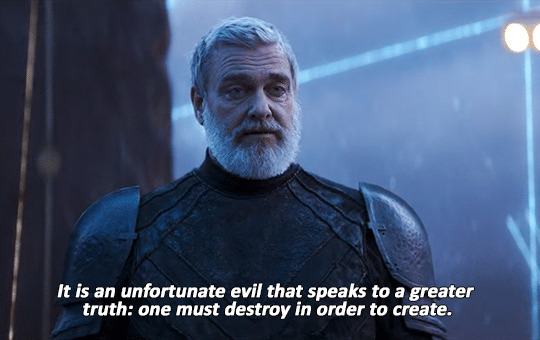
"It is an unfortunate evil that speaks to a greater truth: One must destroy in order to create."
Ahsoka's face says it all, but she's not as snarky as she used to be she was clearly JUDGING Baylan hard and feels like she's heard all this before.
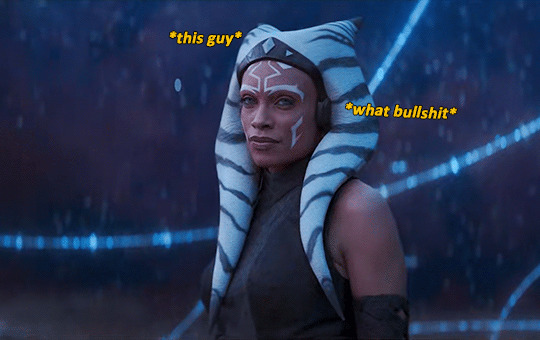
It wasn't a surprise Ahsoka took out her lightsaber and started the fight -- she also made up her mind about taking the map.
It's really interesting how they're both foils but Baylan has a poor opinion of Ahsoka, especially because she was Anakin's apprentice. And Ahsoka has already judged Baylan as a lost cause too, as someone to fight and defeat.
378 notes
·
View notes
Text

I want to fuck you like an animal.
📷 source: Echoing The Sound
376 notes
·
View notes
Text
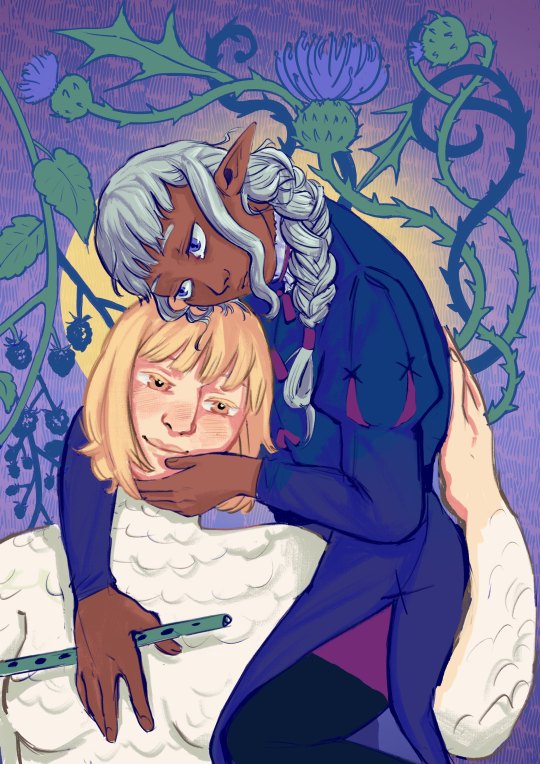
Thistle and Falin
#dungeon meshi#dunmeshi#falin touden#thistle dunmeshi#thistle dungeon meshi#my art#dungeon meshi manga spoilers#i guess. for the chimera form.#their relationship is very important i think and i do wonder how falin would reflect on it if she remembers#thistle was alone for so long and i think falin's berries were probably the first gesture of friendship he'd received in a long time.#and he didn't share them. king of missing the chance for reciprocal bonds.#marcille & falin & thistle. im contemplating. something there.#obviously marcille and thistle#foils#and then falin - thistle and falin - marcille rls.#i mean delgal is obvs thistle's 'falin' but he also does have a rlship with falin. idk. contemplating continues
81 notes
·
View notes
Text
thinking about how Soowon and Yona represent a difference between victory through sacrifice and victory through compassion. Soowon is okay with being the bad guy if Kouka ultimately benefits, whereas Yona’s unwavering kindness inspires hope and garners support from even enemies. Soowon gave up every close relationship he had so he wouldn’t be blinded by affection in pursuit of his goals, while Yona’s affections are her very motivation and through them she is able to strengthen herself and those around her. both Yona and Soowon sway others, albeit in different ways. Yona speaks to people’s hearts and their yearning to be better, inspiring them to help her, but Soowon gets to the core of others’ goals and supports their motivations in a way that they end up wanting to be his ally
#Soowon and Yona are foils in many ways#it’s been especially interesting seeing them work together recently#akatsuki no yona#yona of the dawn#yotd#akayona#yotd manga#princess yona#soo won#foils#yotd analysis#akayona analysis#akatsuki no yona analysis#yona of the dawn analysis
56 notes
·
View notes
Text
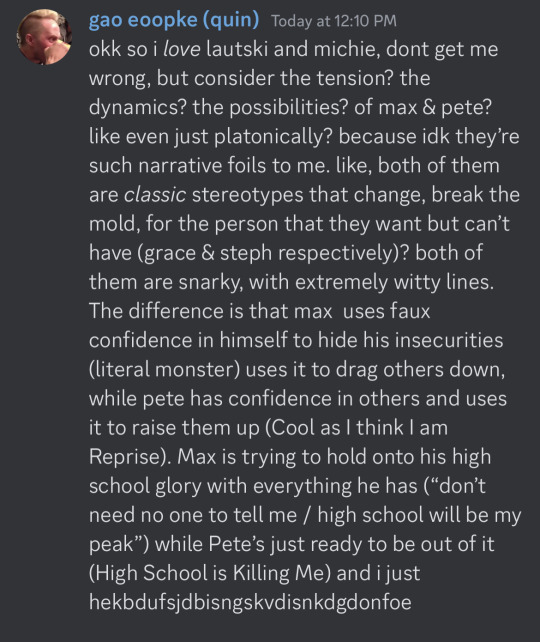
went on a tear the other day,,, think i mighta been onto something
#nerdy prudes must die#starkid#starkid nerdy prudes must die#hatchetfield#peter spankoffski#pete spankoffski#max jagerman#anaylsis#spankerman#jägoffski#narrative foils#foils#character foils
80 notes
·
View notes
Text


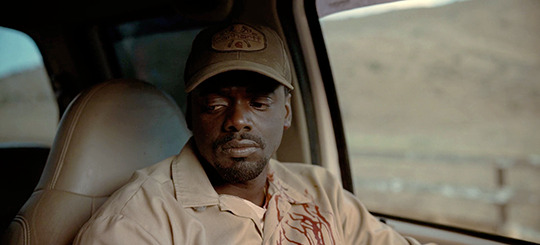


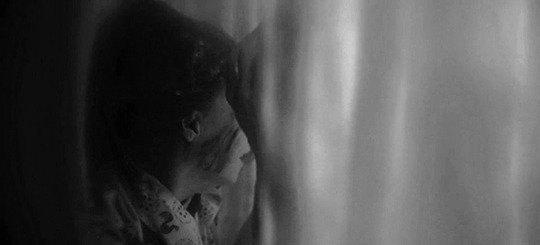

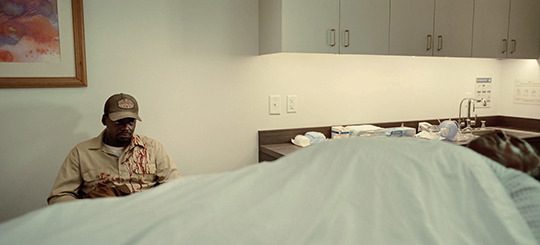
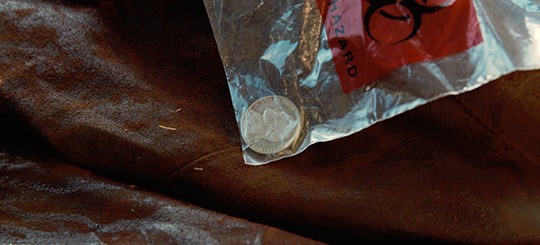
devil house by john darnielle // nope dir. jordan peele
#nope#ricky park#oj haywood#otis haywood sr#devil house#nope 2022#nope spoilers#jean jacket as trauma#foils#they are foils and i will write about it but this kept me awake last night and i had to do it#jupiter park#gordy's home
724 notes
·
View notes
Text
Writing Tips - The Dos And Don’ts Of Writing Foils (with examples from Miraculous Ladybug)
TL;DR at the bottom for those who don’t wanna listen to my rambles first
A writing foil is when two characters are compared and contrasted in order to highlight the qualities of one of them, usually done to highlight the positive traits of the protagonist against the negative traits of the antagonist. But there are times when foils can miss their mark, and I can’t think of more blatant examples than in the show Miraculous Ladybug to show the difference between good and bad use of foils with protagonist Marinette and antagonist Chloé
I’m a firm believer in analysing bad examples of writing as well as good ones, and as much as I can enjoy watching MLB it’s good to acknowledge its weaker points when they come up
Comparison 1 - Evillustrator
Episode Summary:
The titular villain-of-the-week, aka Nathaniel, wants to get revenge on Chloé after she outed and mocked his crush on Marinette - and at the same time, Chloé’s undervalued friend/lackey Sabrina latches onto Marinette as a new friend now that she realises how toxic and manipulative Chloé is
Foil 1 - What Chloé Did:
At the start of the episode, Chloé, Sabrina and Marinette are made partners for a class project, much to Marinette’s dismay. Chloé starts insisting that Sabrina and Marinette do all the work, and when Marinette says this isn’t fair, she’s assured by both girls that this is the way it’s always been since they started school and that if Chloé presents the work that Sabrina and Marinette produce then it’ll all be fair. Marinette again refutes this and says Sabrina is being used by Chloé, not treated like a real friend, especially when Chloé tries to bribe Sabrina with a hat. Sabrina is incredibly touched and inspired when Marinette stands up for her and quickly rejects Chloé, instead latching on to Marinette
Foil 1 - What Marinette Did:
A couple of hours later at most, Sabrina shows up at Marinette’s house to work on their project. Sabrina also did Marinette’s geography homework for her since that’s what was expected of her during her friendship with Chloé, which Marinette initially tries to politely refuse, but reluctantly accepts just this once when she sees how upset the refusal makes Sabrina. She then apologises to Sabrina but says she won’t be able to work on the project as something important just came up (a supervillain had just broken into her house) but offers to meet up with her later to get the work done. Sabrina responds by yelling at her that she’s making excuses to get out of doing work ‘just like Chloé’ always does. She takes back the homework and storms off to do the project on her own, fully done with Marinette, and later goes back to Chloé, who she believes was her real friend all along
Foil 1 - Assessment:
Chloé’s unapologetic history of dumping all the work on Sabrina, which has gone back years, is not the same as Marinette cancelling last-minute one single time. It’s frustrating, absolutely, but even if Chloé had genuinely good excuses and Marinette was just blowing her off, Marinette still didn’t have a habit of it and even offered to reschedule, which Chloé didn’t do. If memory serves Chloé didn’t even apologise, just said she wouldn’t do it and expected Sabrina to work it out. And not only does the comparison not work, it also drags Marinette down rather than building either character up; it makes out that our protagonist is manipulative without rectifying it or presenting it as a skewed perspective by Sabrina as she struggles to fully break away from Chloé. With this being all the foil achieves, I’m gonna say it’s a bad use of foil
Foil 2 - What Chloé Did:
At the start of the episode, Chloé discovers Nathaniel’s crush on Marinette and starts showing the whole class his art that depicts his crush, loudly mocking both his artwork and his taste in women. This is what leads Nathaniel to be turned into the titular villain Evillustrator, with the power to make anything he draws come to life, by our main superpower-dispensing supervillain
Foil 2 - What Marinette Did:
While working with one of the superheroes to try and defeat Evillustrator, which would turn him back into Nathaniel, Marinette agrees to go on a date with Evillustrator in order to steal the cursed object that gives him his superpowers. The plan is briefly successful, and when Evillustrator catches on, he laments that Marinette is just like Chloé because she was ‘teasing him, mocking him and leading him on’. Marinette even follows this up by complaining about the fact that people keep comparing her to Chloé tonight
Foil 2 - Assessment:
At no point did Marinette tease or mock Evillustrator, these were all things Chloé did but it’s shown multiple times that Marinette is genuinely impressed by Evillustrator and enjoying his company despite the situation. Moreover, at no point did Chloé lead Nathaniel on; she was purely insulting towards him, and only Marinette lead him on. The comparison falls very flat when all the reasons the two girls are apparently ‘just like one another’ weren’t mutually inclusive at any point. It’s like saying that Batman and Superman are just the same because they both live in ice fortresses and wear masks to fight crime
Comparison Summary:
Both attempts at foils drag Marinette down rather than building her or Chloé up, so why are we supposed to root for her over Chloé? I didn’t gloss over any narrative contrast where these comparisons are framed as wrong, these are supposed to be lessons that Marinette learns from, which supports the idea that these views are correct. Not to mention that both foils ignore the difference in intentions; Chloé is very blatantly bullying and using people, whereas Marinette was only trying to do what was right, even if someone felt hurt in the process there was always an intention to do good. These differences are never brought up, the foils are purely to make Marinette look bad with no nuance attached, and that alone is the mark of a failed foil in my opinion
Comparison 2 - Despair Bear
Episode Summary:
Chloé calls the fire department to the school in order to interrupt a special class, coincidentally taught by Marinette’s dad, and Marinette spots her in the act. Chloé blackmails the principal into letting her out of the school-wide punishment for this action, but this is the last straw for her childhood friend and crush, which results in Chloé hosting an extravagant party for the whole school in order to prove that she can be a good person and win her friend’s approval back
Foil 1 - What Chloé Did:
Chloé isn’t interested in the peasant work of a one-off baking class, and after complaining about it to all her classmates, she steps outside to call the fire department, informing them that there’s a fire at the school. Once the FD arrive, the whole school is gathered while the principal demands to know who called them. After nobody fesses up, the principal calls for the entire school to clean the premesis for the rest of the day as punishment - but Chloé threatens to call her father, the mayor, to complain about being punished for ‘someone else’s’ actions, and so she’s the only one who doesn’t have to clean
Foil 1 - What Marinette Did:
Marinette knew Chloé had been complaining about the class and wanting to get out of it, and she saw Chloé making a phone call a few minutes before the FD arrived. She was going to say this when the principal asked who had called the FD, but her friends told her to ‘not stoop to Chloé’s level’ and that it would make them just as bad as each other. At very least the class were all confident that Chloé did it, and she didn’t deny this afterwards, but the whole school was still punished regardless because Marinette didn’t speak up
Foil 1 - Assessment:
How is providing evidence that someone may have done something equivalent to abusing emergency services and blackmailing people? Genuinely don’t understand this. I have no idea what the comparison is supposed to be and that’s a pretty good sign of a bad use of foil
Foil 2 - What Chloé Did
Chloé and Marinette share a friend/crush, Adrien, who threatens to no longer be friends with Chloé if she can’t prove to him that she can be nice to people. This friendship means a huge deal to Chloé, so she throws an over-the-top, extravagant party and invites the entire school so that Adrien can see how nice she really is. She frequently starts to be mean to people again, but her butler helps encourage her to be nice by basically saying “Your teddy bear wouldn’t approve” and it actually works for a bit until this tactic is exposed and she fires the butler. She later helps the heroes defeat a supervillain and is deemed a good enough person for Adrien to forgive her and remain friends with her - which leads her to instantly start being mean to all her guests again, to which Adrien chuckles fondly about how she’ll never change
Foil 2 - What Marinette Did:
Marinette, like literally everyone else in the whole school, attended Chloé’s party, with Marinette only going after finding out that Adrien was going so that she could spend time with him. Despite also attending, Marinette’s friend remarks multiple times that Marinette attending the party makes her no better than Chloé because both are using this party as an excuse to improve their relationships with Adrien. She does make unkind remarks about Chloé during the episode, such as calling her a bratty snob and a faker for the ‘BFF act’ she’s putting on with her guests, but she never insults Chloé to her face or makes any baseless accusations all things considered, and she’s hardly the only one making these comments. She’s no more or less guilty in that regard than the majority of Chloé’s guests
Foil 2 - Assessment:
This one really frustrates me because they definitely could’ve gone somewhere with the whole ‘they’re only hosting/attending the party to improve their relationship with Adrien’ thing, but once again they failed to provide any nuance or divergence of intent/results. Marinette only going to the party because a guy she liked would be there is framed as a bad thing because it makes her ‘just like Chloé’ and drags Marinette down to Chloé’s level, but then Chloé is later rewarded for her efforts and praised as ‘a nice person deep down’ despite her frequently insulting her guests. Not to mention the context to this; Chloé is only throwing this party so she looks good, and admits as much, but of course Marinette wouldn’t want to attend the party of the biggest bully in the school who ruined her dad’s class and got her and all her friends in trouble for it just that same morning. Is it such a morally questionable thing to say “I won’t attend this party unless I’ll be in good company”?
Comparison Summary:
The comparisons are mostly fabricated and baseless, with circumstances once again being ignored. Like many aspects of this show, there’s some interesting setup and potential that is sadly either not followed through on or poorly executed, and it hurts the writing. And once more, the foils focus more on dragging our protagonist down and not building either character up, yet Marinette is still the hero while Chloé is still the villain
✨ TL;DR: ✨
So what can we learn from two of Miraculous Ladybug’s most prominent foil episodes when it comes to writing foils?
Remember the surrounding context. Looking into why your characters think and act the way they do is often key for comparing them
Consider intentions, executions and outcomes individually. Just because characters had the same intentions or performed the same actions doesn’t mean that they’re ’just the same’; similar intentions may be executed differently and similar executions may have been inspired through different intentions, and of course the outcomes should reflect both of these
Recognise the purpose of your foil. Do you want to build someone up? Drag someone down? Both at once? It helps to know what you’re aiming to achieve to ensure that the foil has the desired impact on your reader
Assess the validity of your comparison. If a character in-universe is making the comparison, it has to be understandable why they would see things that way, even if it’s not wholly accurate. The narrative should generally try to take a truthful perspective on it as well, rather than agreeing with the unreliable narrator that two actions or intentions are just the same regardless of context. Especially avoid making a comparison where your examples don’t apply to both characters unless to highlight them as different
#foils#miraculous ladybug#writing#writers#writeblr#bookblr#book#writers on tumblr#writerscommunity#writers of tumblr#writer#how to write#on writing#creative writing#write#writing tips#writblr#female writers#queer writers#writer things#writer stuff#writerscreed#writing is hard#writing advice#writing life#writerblr#writers and poets#writersnetwork#writersociety#writerslife
22 notes
·
View notes
Text
This is just a dump post cause I think too much about a dog guy
So I made an OC called Dogman (he's a superhero, because obviously.), basically being a dog in human form but my goodness do I make things...
He is every dog motif in one person. He refuses to give up on anyone, even those who are far beyond saving. He will go through great pain and hurt to protect everyone from anything. He doesn't understand when someone doesn't like him or doesn't want to be his friend. He tries and tries to gain positivity in everyone's eyes. He has a boiling point. He barks, snarls, bites. He is good, he hopes.
Protecting his small town, he's adored by everyone. No one wants him to leave. Not even his nemesis, Sterling Shaw.
They make me want to scream.
Sterling "I can control people simply by touching them" Shaw & Connor "I've never been afraid to touch you" Cairn.
Sterling "everyone leaves me so I'll kick them even harder" Shaw & Connor "I'll never leave, no matter how hard they kick" Cairn.
Sterling "I'll destroy Connor, I'll ruin him" Shaw & Connor "I'll save Sterling, I'll protect him" Cairn.
DO. YOU. FUCKING. SEE.
Sterling has never had a friendship unbound. He doesn't understand giving. Only taking and taking. He has never had a connection not built on chains and demands. He latches onto his slaves' need to obey. They need his orders like they need air. He is bad, he knows.
They're sick. I love them.
Also I made a playlist for them, if you're interested!! It's mostly Mitski, cause I have a problem.
I came up with this idea and these characters YESTERDAY and they've rotted my brain.
I need someone else to understand my vision. Please.
#original character#writing#oc#oc original characters writing#queer#writerscommunity#dog motif#dog metaphor#superheros#superhero#superhero oc#villain oc#toxic yaoi#doomed yaoi#old man yaoi#... eventually#character foils#narrative foils#foils#film school#their enmity starts when they're in their twenties until they're sixty#enemies to...#even worse enemies#dog coded#me coded too tbh
18 notes
·
View notes
Text
Xander Matthews & Min Jeung - Narrative Foil Trait Compilation #1
How does this series work?
This is my narrative foil disection series for Danganronpa Despair Time based on my post Danganronpa: Depsair Time foils theory.
The presented theory is that the CH1 recap shows off all narrative foils in DR:DT based on how the pairings in said recap video are paired.
This series will go through all 8(?) of these foil pairings and disect the dichotomy present in them in a more in depth manner. I will do this primarily by comparing and contrasting Backstory, Motive, Flaws & Character Arc. (Credit to Barbieronpa for that compliation of concepts.)
All of these posts will contain heavy spoilers and will be updated as the series goes on and more information on the characters is presented. If you are interested in the those updates please return to each of these posts after the end of an episode batch.
This will only look at presented content within the series;outside of the foil theory itself it will not take into account theories & speculation.

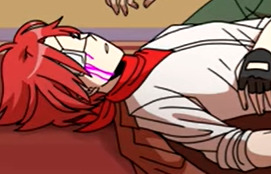
Backstory
Xander:
-> Born in the States. Went overseas for some type of private schooling in the UK.
-> Had a family of at least 3 members left behind in the states. Presumed/Implied heavy poverty.
-> Family died of a waterborne illness while he was away at private schooling. This incident had something to do with Duke Spurling.
-> Their deaths were particularly gruesome.
-> This incident resulted in Xander becoming the Ultimate Rebel
-> At some point during the timeskip of around 2 years before the prologue Xander lost an eyes. It is not clear how he lost his eye.
Min:
-> Born into a family with at least two parents and no known siblings.
-> When she was young her family had some financial struggles. The depths of this were not explored but it was severe enough to encourage drastic action.
-> Min was visited by a member of X-Tech Future when she was young who offered the potential for Min to join a competition for the title of Ultimate Student. He funded her family so long as she continued this pursuit.
-> This resulted in Min dedicating her whole life to becoming the Ultimate Student and never being able to accept anything less than perfection.
-> Min eventually took the test for becoming the Ultimate Student. She's sure she didn't score perfectly on this test, but, instead won because she exhibited the qualities the Academy most desired in an 'Ultimate Student'.
Compare/Contrast:
-> Both born into families which struggled financially.
-> Both suffered because of the whims of some bigger corporation.
-> Min dealt with X-Future Tech while Xander dealt with the Spurling Foundation. (More accurately, a politician who was heavily funded by the Spurling foundation.)
-> Rebel V. Student Dynamic


Personality
Xander:
-> Energetic
-> Loud
-> Active
-> Emotion Based
-> Extraverted
Min:
-> Lethargic
-> Quiet
-> Passive
-> Logic Based
-> Intraverted

Motive
Xander:
-> Xander was motivated by the death of his family to oppose the big corporations which caused his suffering to begin with.
-> Xander's personal convictions were strengthened as a result of the suffering he experienced.
Min:
-> The suffering Min experienced as a result of the corporation largely benefited her family.
-> Min's personal convictions were weakened as a result of the suffering she experienced.
Compare/Contrast:
-> Both are largely motivated by the corporation which harmed them.
-> Xander takes a proactive role as a result of this while Min takes a reactive, passive role as a result of this.
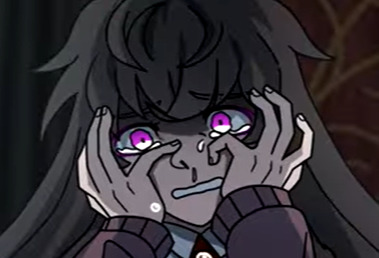
Flaws
Xander:
-> Xander is impulsive and his emotions are easily toyed with / influenced by others. Especially those he already respects.
-> Xander is willing to justify bad behavior if it aids him in succeeding at his goals;he is 'self righteous'.
Min:
-> Min is slow to act and open up to others. She passively accepts the world as it is and doesn't act until absolutley forced to.
-> Min is emotionally closed off and represses her desires for something different. She has too many regrets to accept simply dying.
Compare/Contrast:
-> Both were willing to justify the deaths of others if it meant achieving their own goals;this was largely for two very different reasons.
-> Xander was too willing to risk it all while Min waited too long to do anything at all.
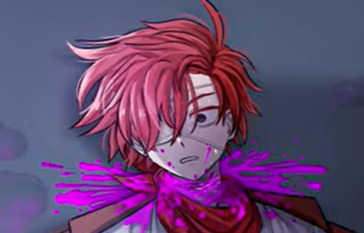
Character Arc
Xander:
-> Xander tries to get another student who is closed off to open up and trust others
-> Xander chooses to betray this person and attempt to murder her because some unknown party instructed him to do so
-> Xander fails because he rushes ahead without thinking of the consequences
Min:
-> Min wants to open up to others because she's spent most of her life focusing on nothing but her talent
-> Min is very passive in this pursuit and ultimately it results in her accidentally killing another.
-> Min 'saves' somebody and then uses this to justify her pursuit of self preservation in the trial.
-> Min fails because it took her literally facing death to make a strong decision - and this decision costed another's and her own life.
Compare/Contrast:
-> Min and Xander both tried to 'save' another person who they ultimately betrayed in the pursuit of their own goals.
-> Min and Xander both died on an impulse decision without thinking of the consequences.
#danganronpa despair time#drdt#drdt spoilers#xander matthews#min jeung#narrative foils#foils#character foils#drdt foils
44 notes
·
View notes
Text
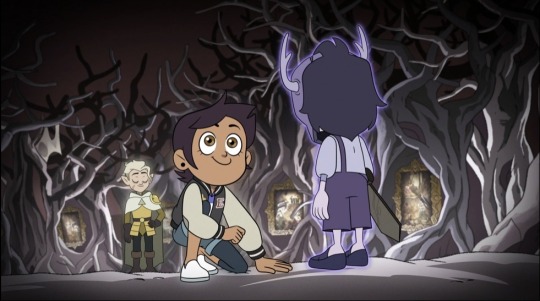
I’m thinking of how when Luz entered Belos’ mind, she was immediately greeted with the ‘child’ in this villain and tried to believe in him, look for that child, acknowledge and treat him as such! Only to find a fully-grown man who knew exactly what he was doing and intentionally emphasized a facade of helplessness to manipulate Luz, which left her so horribly betrayed and traumatized for her effort, having her kindness taken advantage of. Luz tried to exercise empathy and she was hurt for it!

But then she meets the Collector, someone she was predisposed to viewing more as a threat and villain, not expecting a child and no longer looking for that; And she still notices!!! She notices not long into actually interacting with the Collector that they’re a little kid, one who is trying to hide their vulnerability to appear strong! A lonely and insecure kid who doesn’t know how to socialize or use their power properly, and doesn’t even understand death! After looking for the child in a villain, here she finds a villain and realizes they’re a child!
And it’s like Gus y’know; The way they both extended trust and sympathy but got hurt for it, and so they wondered if there was something inherently wrong with themselves, with their approach. But then after the pain they’re gently reminded, reassured, that no it’s still worth it and it’s worth trying again and again. They’re kind but not in a naïve way; It’s a kindness born of knowing exactly how cruel the world can be and choosing to be kind anyway, just as choice is such a big theme in the finale.
So then we have Luz recognizing herself in the Collector, and when the Collector learns like she does, that’s when she has to explain that sometimes the compassion approach doesn’t apply to situations a little more complicated than that, not THIS time. Not always, but there’s still so many opportunities to do so. Luz isn’t punished for trying to find the child in someone else, for trying to empathize; She just needed to learn to balance that with knowing that sometimes the other side of a person is an adult who won’t always listen.
She’s learning to look after herself too, Luz is being kind to her own inner child and wonder and innocence, granting forgiveness and grace she never got and/or refused herself, and that’s who the Collector is for Luz in a sense; Her inner child incarnate for Luz to talk to and make peace with, just like the Inner Willows; Itself a callback to the whole mindscape sentiment echoed in Hollow Mind, except while Luz can’t make that work for Belos, she can make it work for herself, even if she can’t visit her own mindscape. Kids (such as Luz herself) aren’t monsters who must be punished to learn. There are still weirdos out there who understand Luz and vice-versa.
270 notes
·
View notes
Text
"Now, that's how I know you're lying. If Chrissy was scared, if Chrissy wanted help, she would have come to me."
This one line provides such insight into why Jason is the perfect foil to Lucas. They were placed in the same situation and handled it very differently.
Both Lucas and Jason had suicidal girlfriends who were not opening up to them, lying and pretending to be fine. Where Jason, in his grief, was more willing to kill people than come to terms with the fact that Chrissy would hide this from him, Lucas took responsibility for not being more supportive of Max.
Jason is biased and violent and rude, but the key difference between the two is that in their near-identical situation, Lucas takes responsibility and initiates change.
#lucas sinclair#lucas sinclair analysis#foil#jason carver#jason carver analysis#stranger things#i love a good antagonist analysis#and i LOVE when a single line reveals their entire motivation like this#he was an asshole in episode 1 and that fueled who he targeted and his predisposition for closemindedness#but he was also grieving#i think he was an asshole#but i don't think he would have been so violent before that pushed over the line#he was a regular asshole before the stakes got so personally raised for him#before his mind went to “either eddie killed chrissy...or i did”#foils#textual analysis
20 notes
·
View notes
Note
Jon dreaming of him being in black ice armor and killing people he loved with his red burning sword is interesting. It's like he became what he is afraid of becoming. The red burning sword implying him being AA. Not a hero but monster. Dany has a dream where she is in place of Rhaegar wearing black armor and riding dragon to kill Usurpers. She felt excited over it. While Jon was horrified by his dream. Jon is fighting against to become a monster while Dany is embracing it.
I made a post on the subject a while ago that looks into it a bit more closely.
But yes, you put it really well. The dreams as well as the aftermath of those dreams, create a huge contrast between Jon and Dany.
Both dreams happen the night before a major and transformative decision, and they reflect their inner struggle with the weight of the responsibility.
Jon viciously battles with every single foe face to face, distressed, confused, overwhelmed. It intentionally mirrors his battle atop the wall against Mance's wildling host, but it's peopled with everyone, escalating and horrific. Then he wakes - and he creates peace where there was war, by letting the wildlings past the Wall to safety from the true enemy.
Dany, in response to a conversation about Rhaegar dying because he fought honorably, dreams herself in his place, and joyfully burns her faceless enemies from dragonback. "The other was a nightmare, and I have only now awakened." It's as explicit a homage to "waking the dragon" as you can get without spelling it out. She wakes - and creates a massacre by essentially repeating her dream.
Dany chooses the fantasy of easy power, easy victory.
Jon has no ease in this, he is is all conflict, doubt, uncertainty.
132 notes
·
View notes
Note
Okay, I have a (hopefully!) fun discussion question for you in line with the teaching tool I'm working on for my class: Do you think the show sets up Jamie Frasier and BJR as foils and, if so, does it do so effectively?
Goodness @lyledebeast you really cannot give me a better Ask than that!
Answering these questions comprehensively would take a very long time because there are so many different parallels drawn between the two characters across both versions of Outlander canon—the show itself and the novels that inspired it. Indeed, the establishment of Black Jack Randall and Jamie Fraser as foils happens early and consistently in both the TV adaptation and the book series.
So my short answers are: Yes, absolutely the show sets up Jamie and Black Jack as foils. And yes, I think it does so quite effectively!
As a refresher for readers, foils are characters established with intentional comparisons and contrasts to differentiate unique aspects of each persona. Protagonists and antagonists often get established as foils to elucidate one another’s positive and negative qualities. I would definitely say this happens consistently between Jamie and Randall in Outlander canon—and in both directions at that.
Although it would take quite a lot of words, even for me, to provide a comprehensive overview of all the specific things both the show and the books do to establish Black Jack and Jamie as foils for one another, I can give a concise overview of the foundational work each version of canon does to set up the continuous parallels drawn between the two characters. The original Ask addresses the show specifically, but I’d never miss an opportunity to encourage y’all to flex your reading muscles! So I’ll include additional details provided in the books for context that enhance the TV adaptation’s framing of Randall and Jamie as foils.
For my money, there’s no better illustration of the foil dynamic between the two men than the juxtaposition of the two main flogging incidents from Season 1 of the TV show and its equivalent content in Book 1 / Outlander in the novel series. First is the retrospectively narrated 1740 sequence set at Fort William, wherein Randall flayed the upper layers of skin clean off Jamie’s back with with a nine-tail whip. Second is the live-action 1743 sequence set at Castle Leoch after Claire Beauchamp gets rescued from Fort William, wherein Jamie beats her with a belt for disobeying him and thus putting himself and his clan in danger.
On the show the belt scene is played mostly for laughs, but we do get an edgy scene subsequently in which Claire menaces Jamie with a knife and tells him he’d better never raise a hand to her again unless he’d like to get dismembered. I enjoyed that scene quite a bit. Stick him with the pointy end and all that! That said, it’s missing a critical bit of intrigue from the books that further cements the foil dynamic between Randall and Jamie. Specifically: In the book version, Jamie explicitly tells Claire that he got a sexual charge out of beating her because of how angry she got and how feisty it made her.
If this sounds familiar, consider how Black Jack tries everything he possibly can to get emotional responses out of Jamie. Not just while raping him at Wentworth Prison, but also years before while flogging him at Fort William. His whole aim in whipping Jamie that second time was to get him to cave and have sex with him, having made a bizarrely earnest proposition the previous evening that got rejected after Jamie gave it some thought.
Rather a lot of thought, to wit. In both the show and the novels, Jamie notes that he ultimately turned Black Jack down because he didn’t want to let his dad down by ceding control to someone else. He doesn’t indicate being put off himself by the idea of having sex with another man. Likewise, he doesn’t think his dad would be disappointed in him for sleeping with a guy if he did that of his own volition. Randall seems fully cognizant in both versions of canon of Jamie feeling some conflicted attraction to him and enjoying winding him up. So he figures it’ll take more effort to persuade Jamie to his position.
I’ve explored this in my “Shaking in the Light” fic wherein Black Jack explains the Fort William incident to Mary in his own words. In both that “Dispatches from Fort Laggan” continuity and several of my other stories, Black Jack and Jamie discuss the flogging and each of their respective motivations in that interaction. All of this draws on the canonically established character traits of both Jamie (physically, as established by his own behavior at multiple timepoints including the beating he wholly unnecessarily jumps at the chance to take for Laoghaire MacKenzie) and Black Jack (emotionally, as established by the Duke of Sandringham’s comments about him) being gluttons for pain.
Perhaps the greatest irony here is that between Black Jack and Jamie, we only ever get evidence of one of them beating his wife—and it very much isn’t Randall. Confirmed later via Black Jack’s son Denys Randall in Book 9 / Go Tell the Bees That I Am Gone wherein Denys contrasts his mother Mary Hawkins’s memories of his father with her experiences of being married to his stepfather Robert Isaacs, who did beat her. Tracks absolutely with what we knew about Black Jack when he was still alive, mind. Whatever else one might say about him, he was always good to his family and cared about doing the best he could for them.
Then of course there’s Claire herself constantly fearing losing Jamie to Black Jack in both versions of canon. An understandable fear given how resoundingly obsessed Jamie remains with Randall even decades after his death! During early installments when Black Jack still lives, Jamie keeps deliberately goading him into snapping and doing violent things to him.
NB: It absolutely is not Jamie’s fault that Randall rapes him. Anyone who thinks the survivor of a rape is ever at fault for what happens, no matter what they did, can shut the entire fuck up.
However, in many other cases Jamie does go out of his way to antagonize Randall and goad him into fighting with him. The best example of this is the duel (actually multiple duels given the first one gets averted) to which Jamie challenges Randall in Season 2 and Book 2 / Dragonfly in Amber respectively. Definitely one cluster among several, though.
And Claire is far from the only person who notices this. Perhaps the best narration of these observations though comes from Dougal MacKenzie, whose disparaging comments about Jamie in Season 1 of the show are amplified to a damning degree by additional context from Book 1 in the novel series. When Dougal is giving Claire his own retrospective on the events at Fort William three years prior, Claire asks him why he’s telling her all this. He says he thought it might serve as an illustration of character. She thinks he’s only referring to Randall at first, but he clears up this misconception swiftly. He’s definitely referring to both men—and he isn’t wrong in the slightest.
Both the books and the show include a recurring theme of Black Jack and Jamie experiencing a lot of the same stuff emotionally but only one of them actually understanding the assignment of what’s going on between them. Nowhere is this more clear than in S1E15 “Wentworth Prison” on the TV series, wherein Randall sits down solemnly across from Jamie and asks him why he’d rather die than so much as talk to him.
The interaction that follows is about as close as Black Jack ever comes himself to saying the unsaid, which is fairly clear from both the show and the books. He’s trying persistently to get Jamie to understand that he understands what it’s like both to be pressured into sex and to feel ashamed of wanting something he knows will be destructive. The show makes it pretty clear that Randall himself is being coerced in all manner of ways, including sexually, by the Duke of Sandringham. I could probably write a full monograph on that dynamic alone! For now I’ll simply note that Black Jack’s explicit awareness of the similarity between himself and Jamie includes that particular dimension of shared experience.
Let’s not discount either that by this point Jamie and Black Jack have each saved each other’s life once already. Randall rescues Jamie from the gallows earlier in the episode looking like he’s about to shit a brick for almost not making it down to the Borders in time. And earlier in the season, in S1E09 “The Reckoning” just before he and Claire jump into the bay to escape, he leaves Black Jack unconscious on the floor of his office instead of slitting his throat. At this point Jamie doesn’t know that Claire has a vested interest in Black Jack remaining alive due to him being her 20th Century husband Frank Randall’s purportedly direct ancestor. He spares his life because he doesn’t want to kill him, and says as much later on.
We see this kind of parallelism a lot with the two of them. Including in Book 2 where we get an explicit retrospective from Black Jack about having “taken from him what he has taken from me” during the night at Wentworth Prison. Randall is both finding comfort in some of the only positive memories he has and trying to explain to Claire that Jamie actually does feel something for him—something particular that she can’t take away no matter how much of a hold she might have on him. Glorious bonuses abound in Book 1 as well given everything else we see from that night that didn’t make it into the TV adaptation. Including Randall sobbing copiously and telling Jamie he loves him, begging him to admit he loves him too.
Then there’s also a show bonus for that element of canon: the infamous “don’t stop” sequence from early in S2E02 “Not in Scotland Anymore” when Jamie is having one of his many dreams about Black Jack. TL;DR: A basic functional understanding of anal sex allows clear determination of which man is getting penetrated in that footage. Randall is eating it up and begging Jamie for more. Iconic. Also totally in character.
Again, every character-establishing moment we’ve gotten for Black Jack up to this point indicates clearly that he’s desperate for people to respond to him with passionate emotions. He’ll take what he can get obviously; if that means making someone furious with him or frightened of him he feels that’s better than nothing. But it’s not what he wants most. Jamie reflects this valuation of passion himself many times in both versions of canon, including but not remotely limited to the belt scene referenced above.
In the books it’s likewise strongly implied (before being confirmed later by Randall himself) that Jamie fucked him later in the night while they were both delirious and losing their minds in that dungeon cell at Wentworth. What he says to Claire in S1E16 “To Ransom a Man’s Soul” about Black Jack succeeding in making him realize things he wanted makes far more sense in light of this additional information from Book 2 and the show canon exchange between Claire and Black Jack at the tavern in Inverness where a grieving Randall is busily drinking himself into a stupor.
That about covers the early foundations here. Of course a key difference between the two men—and indeed a central driver of both their dynamic as foils and their antagonism of one another—is the difference from one man to the other in acceptance of sexuality.
Although very aware and resentful of the stigma surrounding both bisexuality and sadomasochism, Black Jack accepts his sexuality enough to be fairly open about it in comparison to other canonical queer characters in the Outlander universe. He does this with a considerable amount of internalized self-loathing, sardonically referring to his “unnatural tastes” and noting he’s well aware of how people see him. But he doesn’t deny his sexuality or attempt to escape it.
Jamie, by contrast, never manages (at least so far) to square with his capacity for attraction to people of similar sex and gender. He remains haunted for decades on end by his constant dreams about Randall, a plotline developed much more in the books than on the show. But damned if the dreams we do see on the show—as described above—aren’t incredibly telling.
In the books Jamie’s dreams about Black Jack only get more sexual over time. He becomes consumed with the dreams to the point of rambling about them constantly to his wife and his sister, both of whom have also experienced Randall getting frisky with them unsolicited. At one point in both the show and the books, Jamie notes to Claire that Randall absolutely succeeded in making him realized he wanted sexual intimacy with men. Then there’s also his sexually and romantically charged friendship with Lord John Grey, who himself has always been open with Jamie about his feelings beyond the platonic. But he still never acts on it—at least so far, though that could change in Book 10 and/or the final season of the show which will cover that content.
For now, I’ll note that Jamie’s dreams also clearly delineate the dynamic of him and Black Jack being foils. And for a final bonus, consider the dream sequence from Book 6 / A Breath of Snow and Ashes suggesting Black Jack as a foil for himself when he shows up in mirror image on both sides of Jamie. That, dear readers, is another topic for another time!
#ask dr. compliance#lyledebeast#foils#small fandoms#outlander starz#black jack randall#tobias menzies#jamie fraser#sam heughan#fanfic#ao3#villain discourse#character analysis#evil redcoat pipeline#delightful#yes good
36 notes
·
View notes
Text
when narrative foils have matching wounds/scars
#pjo#percy jackson#luke castellan#zuko#aang#atla#avatar: the last airbender#foils#mine#dragons rambles#parallels#absolutely one of my favourite things
32 notes
·
View notes